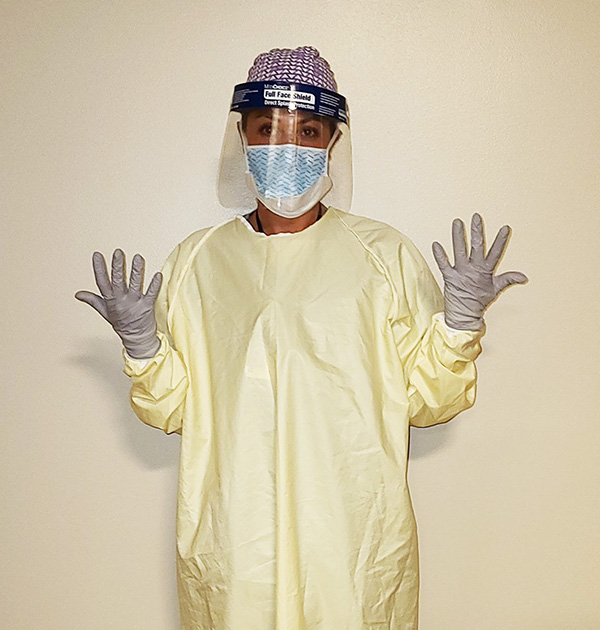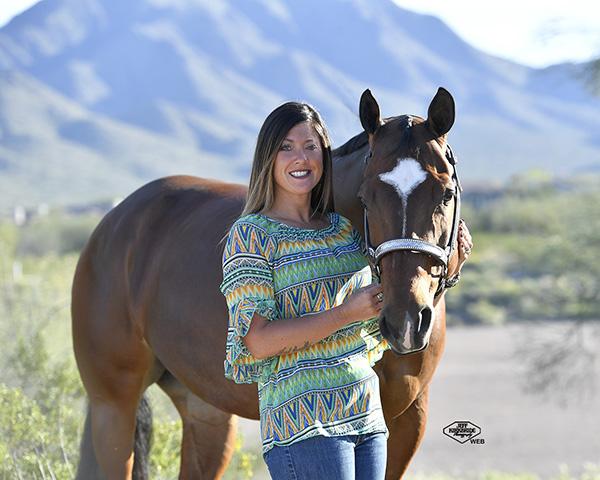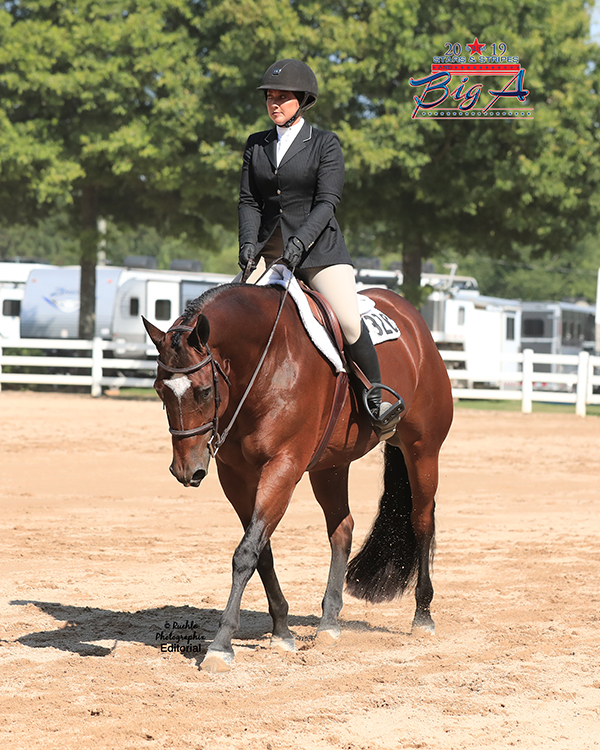On the Front Lines: AQHA Amateur, Kara Flentje, Doing Her Part

Kara fully decked out in her PPE.
By: Brittany Bevis
Life has changed for everyone during the current health pandemic. Many of us are working from home, having groceries delivered, and homeschooling our kids. But, for the most part, we’re isolated from the more serious complications of COVID-19. That is unless you work in the healthcare field.
For those doctors, nurses, x-ray technicians, and emergency room workers, they are on the front lines of the attack against a deadly virus, and they are exposed to it every, single day. That is the situation AQHA amateur competitor, Kara Flentje, currently finds herself in at two different hospitals in Madison, Wisconsin.
“I work for UW Health University Hospital in their Interventional Radiology unit, which is typically emergent situations such as strokes, aneurysms, and internal bleeding in the head and body,” Kara says. “When I’m not at UW Hospital, you can find me at UnityPoint Health-Meriter Hospital working in their Emergency and Operating departments performing ortho (bone) cases and chest X-rays. Both hospitals bring different types of cases and situations, which challenge me and keeps work interesting.”
“I truly enjoy helping people and being a resource for them in a time of need. It’s also not uncommon for me to start my day at one hospital, work a full shift, and transfer to the other hospital to work another. I have been in this field for 10 years, and no two days are ever alike!”
A New Normal
Certainly, the past few months haven’t been like anything Kara has experienced before. She regularly performs chest x-rays on people who have been infected with COVID-19 or are experiencing symptoms. “This requires me to be in close contact with these patients, and I wear personal protective equipment (PPE), such as a face shield, mask, gown, and gloves.”
Like other healthcare workers, Kara is required to re-use her PPE every day. There are “repair shops” and “fix-it” stations in the hospital so they can re-use the equipment. Just to put this into perspective, prior to the COVID-19 pandemic, health care workers would have been reprimanded if they were caught re-using their PPE. However, drastic times call for drastic measures because there is a shortage of live-saving supplies and equipment.
“In addition to the risk of catching COVID-19 ourselves, hospitals are losing money since elective procedures aren’t taking place. This is another stressor on us as we’re concerned about our jobs.”

Photo Credit: Jeff Kirkbride Photography
While Kara is certainly aware of the threats to her own personal safety, she is more concerned with the isolation and fear that these patients are experiencing. “I take my career in health care very seriously and am passionate about helping people. It is heartbreaking at times since these patients are alone, often scared, and, in some situations, fighting for their lives. Families are not allowed to see them, so the healthcare providers are all that they have for physical presence. I do my best to look them in the eyes, talk to them, listen, and provide as much comfort as I can while in their presence.”
Because elective procedures are currently on hold, everyone in the hospital is there for either an emergency or serious illness. In addition, Kara has seen an increase in drug overdoses and suicide attempts. “There is a collective state of uncertainty and a fear of the unknown, which causes some people to resort to excessive alcohol, drugs, and other measures, which are filling the hospitals. I encourage people to reach out to friends, family, and neighbors on a regular basis as it’s important that every one of us has a strong support network.”
Kara’s advice to help prevent the spread of COVID-19 is similar to what you’ve been hearing from the CDC. “My advice on preventing or slowing the spread of COVID-19 is to wash your hands thoroughly, don’t touch unnecessary objects, and avoid touching your face. Distancing is still important, because you may be a carrier and asymptomatic, meaning you don’t show symptoms but can still spread it.”
Missing Horse Shows
Outside of work, Kara’s life has changed as well. As an AQHA amateur competitor and longtime equestrian, she is missing her horse show friends and traveling to competitions. “While I do not like it at times, I made a conscious decision when Wisconsin enacted the Safer-At-Home initiative to be positive about the experience. Like many of my peers, I miss showing horses! It’s such a large component of my life, and the horse community is my extended family. The physical absence of being with my family and friends is also difficult. I’m thankful that we have the technology to be in contact with everyone. This experience will help all of us appreciate the future horse shows.”
Kara began her horse obsession at an early age, thanks to her parents. “My mom is a self-taught equestrian who showed Morgans at the national level and introduced her passion to me. We grew up on a small horse farm, and my mom would provide introductory lessons to 4-H families. From sun up to sun down, my sisters and I were typically doing something horse related.”
Kara competed at her horse show when she was five years old, in her hometown of Baraboo, WI. She didn’t start riding Quarter Horses until she was in her mid-teens, and her family then progressed from Morgans and Arabians to WQHA shows across the state. Her first trip to the Quarter Horse Congress was in 2004 where she placed in the Top 10 in all of her classes and was the Reserve Congress Championship in Novice Amateur Showmanship. That show gave her the confidence she needed to pursue horses at the next level, and she hasn’t looked back since.”

Photo Credit: Ruehle Photographix
“I’m very proud of the fact that I started competing as a youth with only the mentorship of my family and have progressed in the Quarter Horse Circuit as an adult. There is a relentless desire to improve as an equestrian and an unwavering belief that my horse, Stretch, and I can compete at the highest level. Competing in the AQHA circuit does not end at the shows. I work at it daily with a fitness regimen tailored towards riding, eating right, watching film, and riding horses whenever I can. I feel that I’m not only riding for myself, but for my mom, sisters, and every other little girl that grew up in a small town and has big aspirations and dreams!”
In The News- A Heartwarming Story
Recently, the hospital that Kara works at was featured in the news with the story of a husband and wife that both had contracted COVID-19. “The wife entered the hospital on March 18th and was very sick. She was the first patient we worked with that required a ventilator. A week later, her husband was admitted, and he needed a ventilator. I remember coming into work every day with a sense of anxiety about this couple and eagerly sought an update. This couple would require a chest x-ray daily, and the disease was extremely cyclical for them. At one moment, they would appear to be on the road to recovery and then it would change at a moment’s notice, transitioning to an emergent situation.”
“There was a sense of accomplishment when the couple was moved out of ICU and placed in adjoining rooms. While in adjoining rooms, they would engage in conversation and eat meals together. It was sweet. The hospital celebrated when both were discharged on April 16th. They received a standing round of applause from staff as they went through the halls to exit the hospital. There were tears of happiness among the staff as this event instilled confidence in our team that we could beat the virus and bring people back to good health.”
Supporting Health Care Workers
These are the stories that help Kara remain positive and keep her encouraged when heading into work every day. She mentions that the small acts of appreciation, like families placing signs in the windows of their homes, applauding health care workers entering the hospital, and donating meals truly helps first responders get through the day.
“Individuals, families, and businesses have made and donated masks to surrounding health care facilities. In many situations, theses masks are homemade, and you can tell that people put a lot of care into the process. I think it’s helped our country become more aware of cleanliness, and there is a greater awareness not to touch everything you come across. I also think it’s helped our society to really realize and appreciate one another more. I feel like it has made everyone slow down, take a step back, and realize what’s most important in life. Life can change in the blink of an eye, and it’ll never come back.”
“Also, innovation comes to mind as we have seen an abundance of companies adjust their business operations to provide supplies to assist us with medical efforts. In our most vulnerable moments, this country has proven countless times that it is resilient, it adapts, and overcomes adversity. It’s inspiring.”
Looking to the Future
Ultimately, Kara remains positive and looks forward to a time when the pandemic has come to an end and life has returned to normal.
“The COVID-19 pandemic has helped our hospital become stronger as a team. We have an underlying desire to beat this pandemic and do our best to make sure people leave our hospitals healthy. My heart aches for our country. Knowing that it’s going to get worse before it gets better is a difficult situation we’re faced with. I understand that everyone wants America to re-open, and I share that sentiment; but, from a healthcare perspective, it isn’t safe.”
“As a whole though, I would say that we’re positive. We’re positive that we will be there for our patients in a time of need and confident that we will get through this pandemic. We’re all in this together.”
If you have a great story about someone in the horse industry who is helping out during the health crisis, email B.Bevis@EquineChronicle.com.










